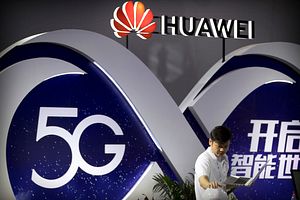Several months ago, I hoped the COVID-19 epidemic could give China and the United States an opportunity to ease tensions in their relationship. Unfortunately, that didn’t happen. On the contrary, COVID-19 may prove to be a watershed for the deterioration of relations.
As we all saw, there have been more and more points of friction in Sino-U.S. relations in the past few months, which have had at least two impacts on Chinese society.
First, some previously moderate scholars are becoming “warriors,” and have begun to lash out at the United States, believing that the Trump administration has brought Sino-U.S. relations into a “new cold war.”
Second, the United States has become an imaginary enemy in the minds of Chinese people. Across society, nationalist sentiment is soaring. You can hardly find an article in Chinese media that will objectively introduce the U.S. situation.
The anti-American atmosphere among Chinese people reached a peak when the Trump administration took all means to sanction Huawei, a Chinese private company.
I’m not a Huawei fan; I have never bought or used any Huawei products, and instead followed the Apple vogue. But this did not prevent me from getting to know many friends who work for Huawei in my journalist career over the past 15 years. One friend told me about a horrible experience in Afghanistan. Taliban fighters threatened him with an AK-47 against his head, detaining his car and holding him prisoner until the tribal elder came forward to free him.
It’s hard to imagine how Huawei employees like my friend working in dangerous countries around the world are harming U.S. interests. While U.S. officials see Huawei as a company that cheats and spies, to most Chinese (including myself) Huawei’s development is a potent symbol of the hard-working nature of the Chinese people, not a threat to the national security of the United States and the West.
In the Chinese imagination, Huawei staff are similar to the Chinese laborers who contributed to the development of American railways in the 19th century, in the face of immense hardship and persecution. They both reflect Chinese people’s persistent and dauntless spirit.
Why is the United States so afraid of Huawei?
One explanation holds that U.S. objections ultimately have to do with China’s authoritarianism. That makes sense. I have always hoped that China’s governance capabilities could be improved.
First, China’s government should be more transparent than it is now, and second, its actions should have clear boundaries. Both of these improvements will help Chinese companies face less suspicion when expanding their business overseas.
In my opinion, however, the difference in perception between China and the United States is a more important reason to explain why Washington is afraid of Huawei. The United States has over-interpreted the relationship between Huawei and the Chinese government, using speculation as evidence for thinking that all private enterprises in China must obey any orders by the government.
If this is the case, then the United States should sever all contacts with China’s private enterprises. Obviously, that would be impossible.
Huawei is already strong enough to dare to say no to the unreasonable demands of the Chinese government. To some extent, the government does not dare to punish Huawei, let alone shut off such a huge business empire easily. For the Chinese government, taking steps against Huawei would have a far worse impact on the regime than the deterioration of Sino-U.S. relations. It would result in massive unemployment in the middle class, a mortal wound to the domestic economy, and an erosion of popular support.
Meanwhile, the Huawei incident has dragged down Chinese perceptions of the United States. Many Chinese people see the attacks on Huawei as proof that the United States is not a country under the rule of law, but instead places politics above the law. There is also a widespread belief that the United States lacks the self-confidence to face a rising China. Many Chinese were surprised that the U.S. is so afraid of a Chinese company, because science and technology prowess is the United States’ most treasured strength. As China births more companies like Huawei in the future, it’s seen as a surety that the Chinese will surpass Americans in the hi-tech field.
As a result, among ordinary Chinese people there is a strong sense that China can wait out the United States. In the short term, some believe Sino-U.S. relations will thaw out after the 2020 election. But more broadly, the view that the United States is in a state of long-term decline is very popular among Chinese.
I don’t know if the second point will hold true, but it is a bit naive to think that a new U.S. administration will bring much hope.
A friend who worked in Huawei told me that, at the end of 2012, during the Obama administration, he applied for a U.S. visa as a Huawei employee. His application was reviewed for 60 days. In 2019, five years after he left Huawei, he applied for a U.S. visa again. It was under review for more than a month, and he was marked for a “security check.” Different administrations, and different political parties, but the same result. Is a connection to Huawei now an “original sin” for Chinese people hoping to visit the United States?

































